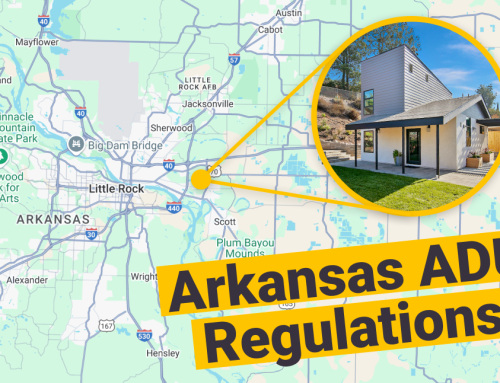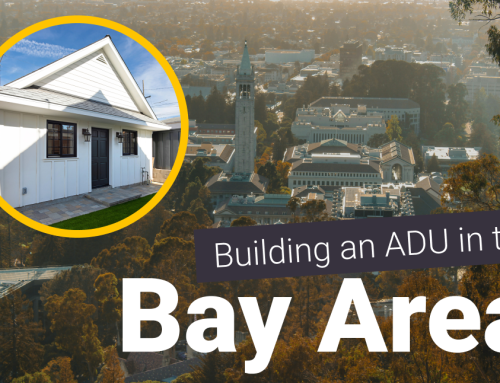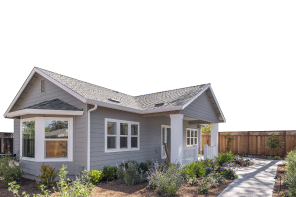Boston is on its way to becoming the next Additional Dwelling Unit (ADU) hub thanks to efforts by Mayor Michelle Wu. Wu’s ADU Pilot Program comes as a response to increasing housing costs in the city. According to a study by Boston’s Office of Housing, 50% of renters are “rent burdened, meaning they are spending more than 30% of their income on rent. It’s no surprise that homeownership presents a greater issue as home prices increase and household incomes remain stagnant.
Inspired by the success of California’s statewide ADU regulations, Mayor Wu’s ADU Pilot Program aims to encourage the construction of additional dwelling units as a strategy to address the housing affordability crisis in Boston.
Let’s dissect the details of this program so far and what it could mean for the future of ADUs in Boston.
What Kind of ADUs are Allowed in Boston?
Several ADUs types are allowed in Boston, however, only ADUs converted from existing space within the primary residence can be built “as of right”. This means that homeowners can bypass certain zoning requirements, such as floor-to-area-ratio, occupancy type, and off-street parking ratios. This is similar to California’s state exempt 800 sq. ft. ADUs.

The following ADU types fall under this “as of right” zoning exemption:
Basement conversion: Basement conversion ADUs in Boston involve transforming existing basement space within the primary residence into independent living units. Remember that ADUs must have their own entrance. If the basement isn’t already accessible from the exterior, the entryway will need to be incorporated into the design. Check out this basement conversion ADU for some inspo for your project.
Attic conversion: An alternative is an attic conversion. The same considerations apply. Make sure your designer is incorporating an exterior entry to the ADU.
Carve-out unit: Part of the first-floor of the primary residence can be converted into a studio. Remember, it must have a full kitchen, bathroom, etc.
What about exterior ADUs?
The only exterior ADUs that are permissible at this time in Boston are garage or carriage house conversions. Keep in mind that these types of ADUs do not qualify for “as of right” zoning code exemptions. These zoning codes, such as floor-area-ratio and minimum lot size, may disqualify you from being allowed to build an exterior ADU.
However, Mayor Wu is currently developing the next phase of the ADU Pilot Program which could potentially extend these zoning code exemptions to external ADUs. If you are interested in being part of the program, you are encouraged to attend a monthly ADU workshop.
What is Required in an ADU?

An ADU is required to have everything required for independent living, including the following:
- Full utilities (water, electricity, and sewage)
- Full kitchen, including cooking stove, countertops, food storage, refrigerator, and outlets
- Full bathroom, including toilet, sink, and shower or bath
- Bedroom or sleeping area with an emergency egress
- At least two means of egress
- Ceiling height of at least 7 ft. 6 in. for a duplex or triplex home adding an ADU and 7 ft. for a single-family home adding an ADU.
By enforcing these standards, local authorities aim to guarantee that ADUs meet the necessary criteria for long-term occupancy, supporting the well-being and autonomy of tenants within these additional dwelling units.
What Properties Are Eligible for ADUs in Boston?
To qualify for an “as of right” ADU, you must meet the following requirements:
- The ADU must be built within the existing footprint of the main home. You cannot extend any part of the existing home for the sole purpose of converting it into an ADU.
- The primary structure must be a single-family home, duplex, or triplex.
- You must occupy the same home in which the ADU is built.
- If you intend on building a basement or first-floor ADU, the structure must be above the Base Flood Elevation if your home in the FEMA Flood Zone.
Boston ADU Loan

Taking the ADU initiative even further, Mayor Wu has made an ADU loan available for low to mid income homeowners. The loan can be used for any interior improvements, additions, or detached structure that would create an ADU.
The amount per household is up to $50,000, depending on the estimated cost of the project. It is interest-free and there will be no monthly payments. Repayment is not due until the owner sells the property, transfers ownership, or undertakes a cash-out refinance on the home.
Benefits of ADUs
Why is Mayor Wu making such an effort for ADUs in Boston? As we’ve seen in California, ADUs offer a wealth of benefits that go beyond just passive rental income.
Multi-generational housing: Studies show that high cost of living is preventing adult kids from moving out of their parents homes. Having an ADU provides a home where adult kids can practice independence and maintain privacy. Around 26% of Americans live in multi-generational housing. This figure has tripled in the last decade. Multi-generational housing may become the norm in the near future and we see ADUs being a big part of it.
Aging in place: Retirement homes can be expensive and conditions are often questionable. Many retirees are finding that building an ADU will allow them to downsize into the ADU and rent out the main house. The ADU can be outfitted with accessible features to make life comfortable as they age. Others have opted for housing a caregiver in the ADU as well.
Passive rental income: ADUs provide homeowners with the opportunity for passive rental income, allowing them to offset housing costs. By creating additional dwelling space, property owners can enter the rental market, contributing to increased housing availability in the city. This not only benefits homeowners financially but also addresses the growing demand for affordable housing options in Boston.
Mayor Wu’s effort for ADUs in Boston is driven by a recognition of these multifaceted advantages. Beyond economic considerations, the promotion of ADUs aligns with a broader vision of fostering inclusive, multi-generational communities and supporting residents in aging comfortably within their familiar neighborhoods.
ADU 2.0: The Future of ADUs in Boston

Phase two of the ADU Pilot Program, ADU 2.0, is already under development. ADU 2.0 be similar to the first phase. It will include a trial of a select few homeowners to go through the ADU process and provide their feedback.
The main difference this time is that homeowners will be permitted to build exterior ADUs converted from unused garages or carriage houses on their property regardless of zoning regulations.
These homeowners will be asked to go through the process from start to finish: design, permitting, reviews, and construction. If all goes well with the trial, exterior ADUs may be permissible as “as of right”. This means they will not need to comply with underlying zoning codes. Boston has already seen positive results from the first phase of the ADU Pilot Program.
According to Wu, there are now about 130 ADUs that have been created in Boston under the program, with 100 more on the way.
Stay in the loop with Maxable
With our finger on the pulse, Maxable has become one of the top ADU educators in the nation. Download our free ADU Tool Kit and sign up for our newsletter to stay up to date on regulations in your city.
If you’re serious about getting your project off the ground, enjoy a free preview of our comprehensive e-course, The ADU Blueprint. This course covers the crucial topics you need to keep your project on track. It includes lessons on financing, best design practices, construction methods, and how to save money along the way.








